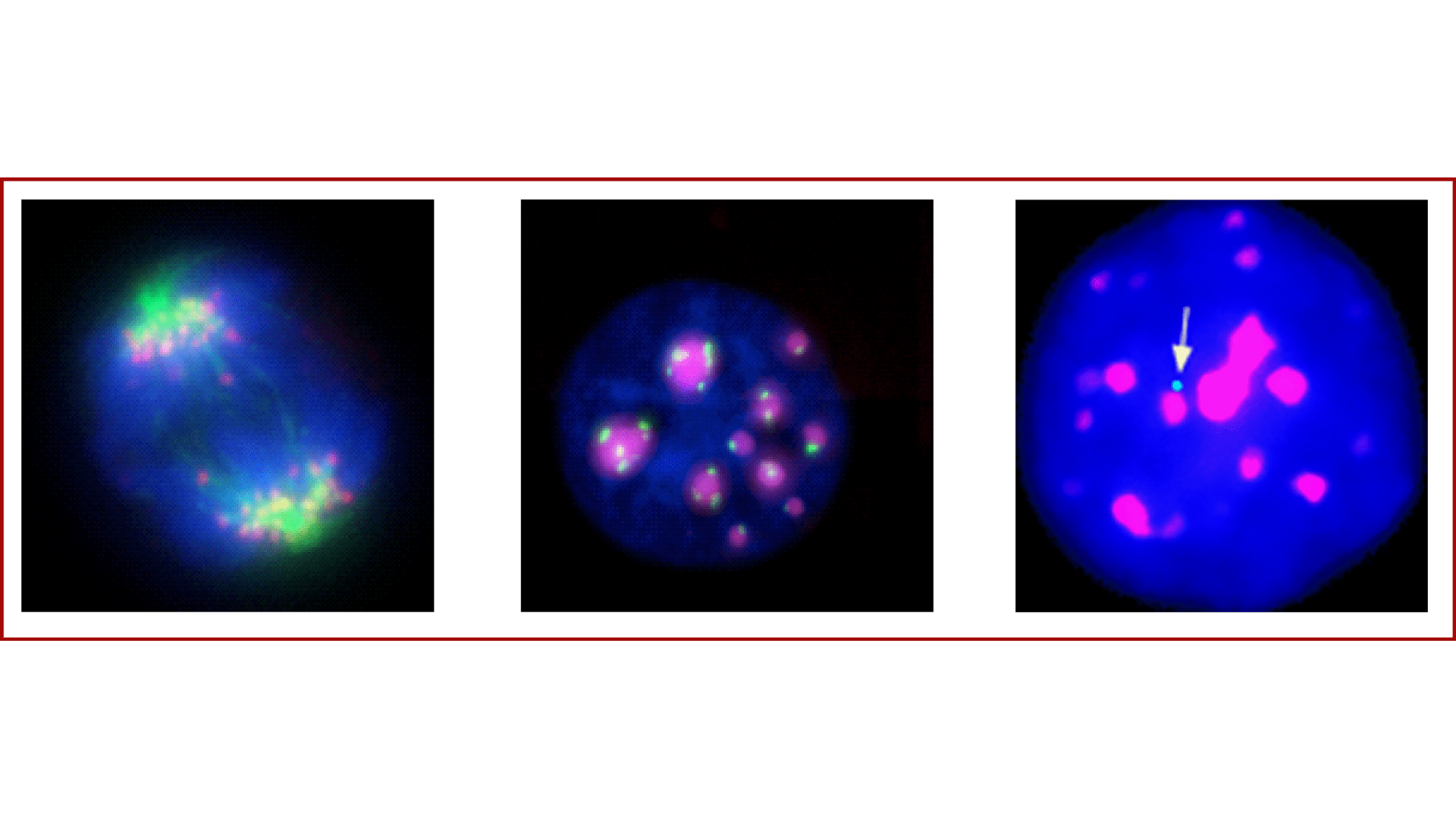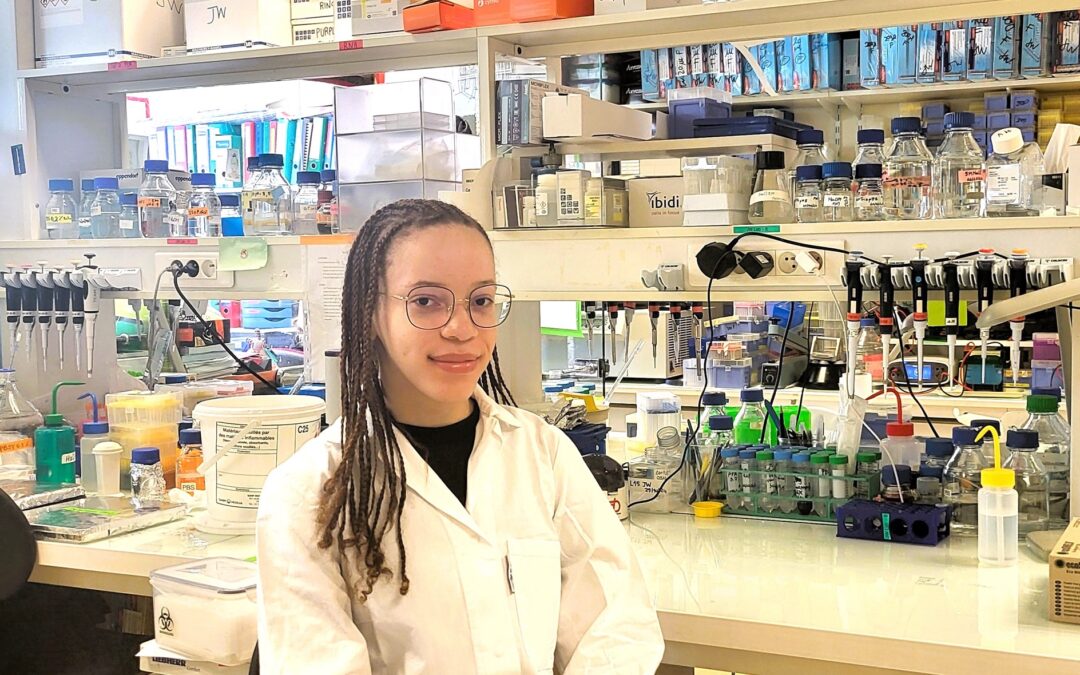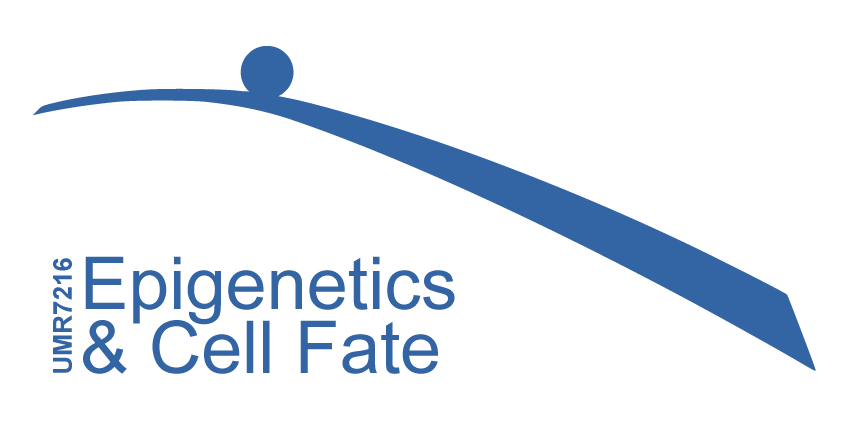Centromeric repeats transcription
A paradigm to link transcription of DNA repeats to global molecular and cellular effects

Cells in several phases of the cell cycle
© EDC
Tandem repeats that underlie centromeric regions have a structural role at the chromosomal level, providing the assembly platforms for the kinetochore and attachment of the mitotic spindle, but also in the functional organization of the nucleus and long-range control of genome expression.
We characterized transcripts that originate from murine centromeric repeats and showed that they are essential for centromere identity and function, whereas their unscheduled accumulation is causally linked to perturbed nuclear organization and cellular phenotypes. However, we showed that the outcome greatly depends on cellular and genetic contexts. In primary cells, increased transcription of centromeric repeats functions as a sensor of stress promoting cell cycle arrest and safeguard mechanisms; in contrast, in contexts of loss of the p53 checkpoints it leads to chromosomal instability.
We explore the causal link between aberrant transcription of repetitive sequences and perturbed molecular and cellular programs, ex vivo in various cellular and genotype context and in mouse models. We also question the mechanisms that lead to their deregulated transcription, with special interest on DNA methylation that is tightly linked with maintenance of integrity of these sequences and hence, with maintenance of genome stability. Ultimately, we aim at deciphering the cellular functions and regulatory factors deregulated by their unscheduled accumulation.
Related publications:
- Hédouin S, Grillo G, Ivkovic I, Velasco G, Francastel C. CENP-A chromatin disassembly in stressed and senescent murine cells. Sci Rep. 2017 Feb 10;7:42520. doi: 10.1038/srep42520. PMID: 28186195
- Guillemin C, Francastel C. [Heterochromatin compartments and gene silencing: human hematopoietic differentiation as a model study]. Biol Aujourdhui. 2010;204(3):221-33. Review. French. PMID: 20950566
- Guillemin C, Maleszewska M, Guais A, Maës J, Rouyez MC, Yacia A, Fichelson S, Goodhardt M, Francastel C. Chromatin modifications in hematopoietic multipotent and committed progenitors are independent of gene subnuclear positioning relative to repressive compartments. Stem Cells. 2009 Jan;27(1):108-15. PMID: 18974210
- Ferri F, Bouzinba-Segard H, Velasco G, Hubé F, Francastel C. Non-coding murine centromeric transcripts associate with and potentiate Aurora B kinase. Nucleic Acids Res. 2009 Aug;37(15):5071-80. PMID: 19542185
Read more

Congratulations to Delphine and Julia for their research funding
Congratulations to Delphine Burlet on getting a postdoctoral grant from the Fondation de France and to Julia Roche Dupuy who obtained a fellowship from the HOB doctoral school to finance her PhD thesis. Delphine Burlet, Julia Roche Dupuy À lire aussi

Welcome to Annabelle, new post-doc in the team!
Annabelle joins the lab as a post-doctoral fellow. She completed her PhD at the University of Oxford under the supervision of Prof. Monika Gullerova. Her doctoral work focused on the role of small non-coding Y RNAs and the RNA-binding protein, YBX1, in intracellular...

Welcome to Orlane
Today, we welcome a new member to the team: Orlane. She's a student from the first year of the Brevet de Technicien Supérieur Biotechnologies en Recherche et Production (Two-year technical degree - Biotechnologies in Research and Production).Orlane will be working...

4th year PhD fellowships for Anaëlle
Congratulations to Anaëlle Azogui for obtaining a 4th year PhD fellowships from the "Fondation pour la recherche sur le cancer" (Fondation ARC). Read more
